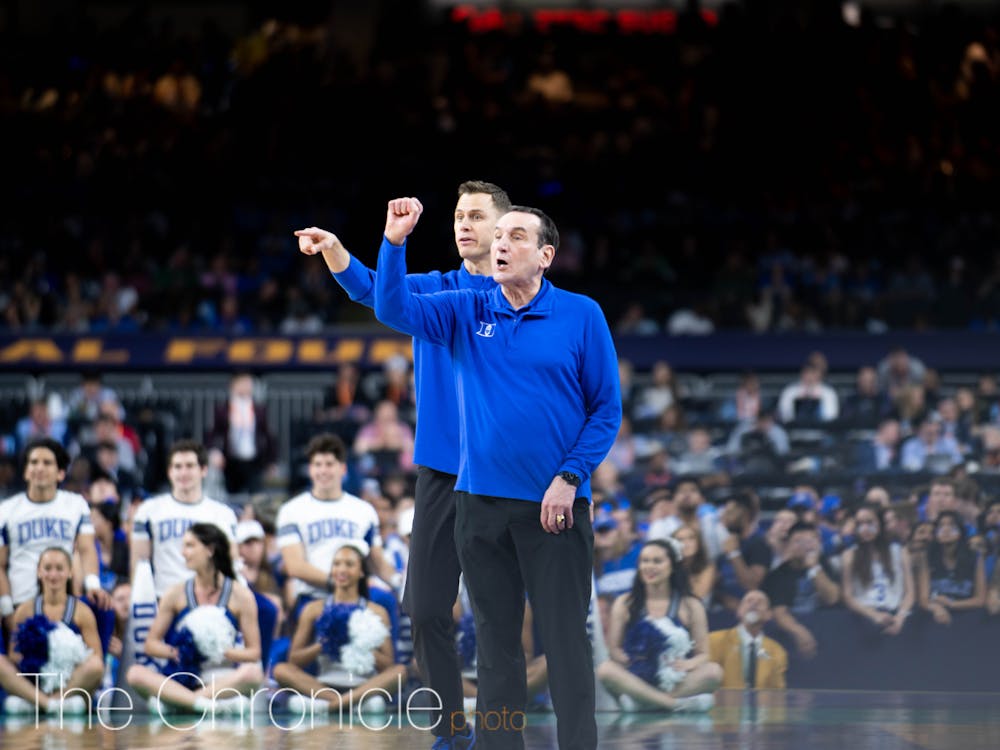It could not have been a starker contrast.
Mike Krzyzewski, in a dark blue quarter zip, sporting a blank expression, waiting to shake hands with Hubert Davis and the Tar Heel players. Roy Williams, sitting in the stands in a striped light blue pullover, arms triumphantly raised in the air as his pupil and former team knocked their rival out of the Big Dance.
That visual came at the conclusion of a 40-minute masterpiece. North Carolina, continuing an all-time heater and advancing to the national title game, in which it would finally run out of gas in a 72-69 loss to Kansas. Duke, despite looking like the best team in the country to that point in the tournament, coming up an inch short of Monday night.
It was a brutal pill to swallow for the Blue Devils.
From press row, the Caleb Love dagger looked good all the way, but when it dropped, I still felt like Duke had a shot to rally. Only when RJ Davis pulled down the final rebound and launched the ball into the air did I realize the finality of it all.
It was over.
But nothing that happened that night in the Superdome should leave the Blue Devils hanging their heads. Not after a night, and season, that saw Duke, at every juncture, spring up off the mat after every punch it took.
“You take care of the people who have been committed to you and have believed in you, and they check every box,” Krzyzewski said on managing his players’ emotions after the loss. “So we're going to help them get past this and then move on because these are all really young guys. They have amazing futures ahead of them.”
There was Paolo Banchero, who likely closed out his college career with, in my eyes, his finest outing of the season. Mark Williams and Theo John dealt with foul trouble throughout, forcing Banchero to trot out at center for key stretches—not an easy task with Armando Bacot on the other side of the ring.
But Banchero left it all out there. Twenty points, 10 rebounds, a pair of threes and two blocks occupied the stat line for the Seattle native, and he nearly dragged Duke across the finish line.
This coming on the heels of a four-game stretch in the West Region, during which Banchero was clearly the premier player on the floor. Next stop, NBA stardom.
There was Jeremy Roach, who responded to that Love three in the final minute with a knifing drive through the lane and a lay-in that cut the Tar Heels' lead to two. Just five seconds after going down four, the 6-foot-2 point guard had the awareness and guts to go right to the basket.
Not to mention the fact that Roach was a catalyst of this March run for Duke, despite losing his spot in the starting lineup twice, first in favor of an emerging AJ Griffin back on Jan. 12, then again Feb. 15 to a re-emerging Trevor Keels. Both times came against Wake Forest, if you’re into symmetry.
Roach's March surge started with a three from the left wing to seal a win against Syracuse in the ACC tournament quarterfinals, and it ended with that quick drive down the stretch in the Final Four.
Now, Roach likely returns to Durham for a third year, ready to lead.
There was Wendell Moore Jr., whose Duke career, whether it ends with him declaring for the 2022 NBA Draft or continues into a fourth winter, has been a lesson in steadfast dedication.
His freshman year, he showed flashes of his five-star self, but they were only flashes. That buzzer-beater in Chapel Hill was one for the ages, but the journey did not end on that Feb. 2020 night for the Charlotte native.
Hard at work over the last two offseasons, reshaping his mind and body, Moore was the epitome of free-flowing brilliance on the floor this season. He was known as “Captain Zero” within the program, and he left zero doubt as to whether he could make the leap as a junior, ending the year with the Julius Erving Award to put on his mantle.
There was AJ Griffin, who, since his junior year of high school, withstood two knee injuries and an ankle injury en route to becoming one of the most effective 3-point shooters in the country. There was Trevor Keels, who withstood a January foot injury to return to the lineup after missing only three games and lived up to his clutch reputation in the NCAA tournament with the tying three against Michigan State and 19 points in the Final Four.
There was Mark Williams, whose constant work with Nate James, Chris Carrawell and Amile Jefferson over the last 20 months was evident in the Virginia native’s head-turning ownership of the paint since mid-January of this past season.
Don’t ask me, ask Banchero and Moore, who both said the day before the Final Four that Williams was the best defensive player they had teamed up with. Some NBA team, should Williams declare for the NBA Draft, is about to get a high-motor shot blocker and rim runner.
And then there’s Krzyzewski. In the two seasons leading up to this one, Duke had backslid—albeit only slightly. Before the 2020 postseason was cut short due to the onset of the pandemic, the Blue Devils certainly had a shot at making a second-weekend push.
That never occurred, and last year’s version of Duke went 13-11, suffered a trifecta of three-game losing streaks and again ended at the mercy of the pandemic.
Krzyzewski wanted one last run before retirement, with a team he was fully invested in and could be around without restrictions getting in the way. While it did not quite end in fairytale fashion, with the Blue Devils gathered at center court while “One Shining Moment” played above, how close they got was indicative of how connected this group truly was.
“I told my wife Mickie, I said, ‘Look, we’re going for it and I’m gonna put everything into it. And I got a group, they’re young, but I think they got a chance.’ And I was right about that,” Krzyzewski said.
“From the very first meeting we had, getting to New Orleans was the goal. So the fact that we got here, it's just a big testament to the work we've put in,” Banchero said just over 24 hours before the Final Four began.
Now, the Jon Scheyer era begins. Changes will occur over the next few months, as Scheyer must still add an assistant to go along with Chris Carrawell and Amile Jefferson and put an early stamp on the entire program, from tweaking the offense to NIL branding. However, the momentum built since last June makes this the perfect time for a transition.
Recruiting, so far, has not slipped an inch. With Scheyer as the face of the program on the trail since June, seven five-stars, two four-stars and a three-star have committed. Not to Krzyzewski. To Scheyer.
Once those guys—starting with a six-man 2022 class defined by Dereck Lively II, Kyle Filipowski and Dariq Whitehead—arrive on campus, they’ll enter the player development program that has so clearly benefited each of the players I just mentioned. From Whitehead to Lively, like Moore and Williams, new stars will emerge.
So when you look back on this season, losing in the Final Four is no doubt a sour mark to end on. When you get that close, and a shot at a title is snatched away so forcefully, it will always hurt.
But also know that a new, exhilarating era has begun, and this was what set it up.
Onward.
Get The Chronicle straight to your inbox
Signup for our weekly newsletter. Cancel at any time.

Max Rego is a Trinity senior and an associate sports editor for The Chronicle's 118th volume. He was previously sports managing editor for Volume 117.

